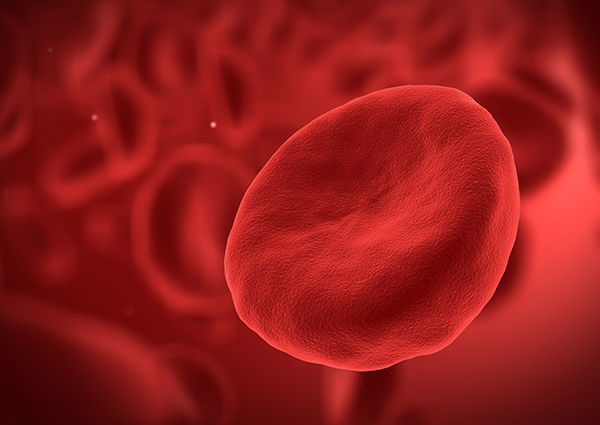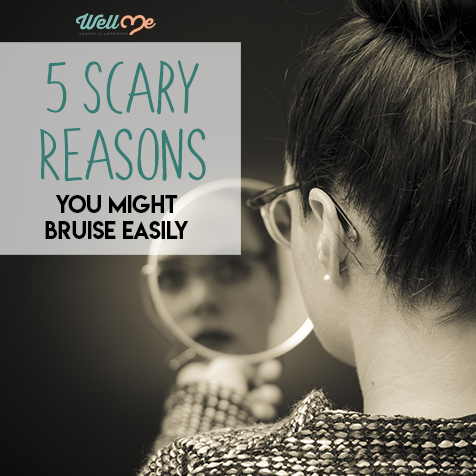Bruising easily can be rather shocking, especially if you haven’t experienced it before. Some people just bruise easily because of their genetics, but others suffer from seemingly unexplained bruising. If you get bruises “out of the blue”, it could in fact be due to a more sinister health problem. Whether it’s blood cancer, sun damage, or a sign of a low platelet count, it’s important to pay attention to what your body is telling you.
In cases of easy bruising, most of the time other symptoms will be involved if there is an underlying condition at play. Let’s look at some of the possible reasons you might be bruising so easily.
1. Skin Damage from the Sun
After you have had years and years of sun exposure, your skin may have sustained a lot of damage. This is somewhat normal, although what can come from it is actinic purpura or senile purpura. This is a kind of bruising that occurs in older people – it looks like patches of purple on the skin. Usually they occur on the backs of hands or on your forearms, and they aren’t brought on by a major bump at all.

You can relieve this kind of bruising to a certain extent by putting on a topical cream that helps the bruises fade. These topical creams usually have retinol or alpha-hydroxy acid in them. Of course, the best way to get rid of bruising from skin damage is to prevent it altogether. If you already have skin damage, you could wear long sleeves to prevent more bruises from appearing. Otherwise, if you don’t have the sun damage yet, you should prevent it by using proper protection on any days where you might have some exposure to the sun.
Surprisingly, many people don’t practice effective sun protection on a regular basis. When you’re going out in the sun, it’s important to always be covered either by clothing, hats, or sunscreen. If you live in a place where you will get some sun exposure every day, for example, you should get used to applying sunscreen every day. Dressing with longer sleeves, pants, or sun hats can also make a big difference in blocking the sun’s damaging rays. In general, it is recommended by the Skin Cancer Foundation that using sunscreen that is at least SPF 15 (if not higher) is important.[1]
2. Liver Problems
If you bruise particularly easily it could be a sign of something rather severe: liver problems. This happens because liver disorders generally result in your blood having lower levels of platelets. This, in turn, prevents regular, healthy blood clotting and the result is that you bruise more easily than usual.
Liver disease or liver damage is a big problem for a number of reasons and it can come from a number of causes. Liver problems can be a symptom of another disease, for example. The following diseases can cause damage to the liver: cirrhosis, alcoholism, hepatitis, infectious mononucleosis iron overload, or liver disease.

So, how do you know if the fact that you bruise easily comes from liver problems? The key is to look at the symptoms beyond just the bruising. Liver issues often cause a number of other issues besides just bruising, such as nausea, vomiting, weight loss, weakness, fatigue, and jaundice. If one of these symptoms applies to you alongside bruising easily, it could mean you have a liver problem that is causing both issues.[2]
If you do suspect you might have liver disease, you need to seek medical help right away. While bruising easily may not seem like a majorly problematic symptom, there are a number of much more dangerous issues that can arise from liver disease.
The liver needs to be able to function to keep taking care of processes such as taking in nutrients and chemicals and filtering them out before entering your blood’s main circulation. It also helps with the digestion of food by creating bile which helps break down whatever you ingest. The liver also replaces damaged cells (and does so much more easily than other organs). However, too many damaged cells can cause the liver to no longer keep up with the demand.
There are far more functions that the liver performs, making it an absolutely crucial organ in your body. If your liver is not working properly due to liver disease or another ailment that affects the liver, it can have extremely detrimental effects on you.
Fun Fact: In North America, the most common cause
of liver disease is alcohol abuse.
According to the Center for Disease Control and Prevention, approximately 1.6% of adults in the United States have been diagnosed with liver disease. This means around 3.9 million adults overall. The CDC estimates that 40,326 people died from liver disease in 2015.[3]
3. Blood Cancer
In one of the worst case scenarios, it is possible that your easy bruising could come from a type of blood cancer. The three main possible blood cancers include leukemia, lymphoma, myeloma, although there are also a few that are much more rare (including myelodysplastic syndromes – MDS and myeloproliferative neoplasms – MPN).

Leukemia affects not only your blood but also your bone marrow. White blood cells start being produced far too quickly, but these cells don’t fight infections. Instead, they prevent the production of red blood cells and platelets by your bone marrow, leading to major health issues.
Lymphoma causes issues mainly in the lymphatic system. The lymphatic system is responsible for the production of immune cells and the removal of excess fluids in your body. White blood cells that fight off infections are called lymphocytes, but abnormal ones start to increase in number in your body’s various tissues which causes immune system impairment.
Myeloma specifically affects your body’s plasma cells, which are white blood cells that help create important antibodies that fight off infections and diseases. If myeloma cells are present, however, they will stop the regular antibody production and will therefore cause your immune system to be weak and your body to be at a higher risk of infection.[4]
If you have some kind of blood cancer, bruising easily is not going to be your only symptom. You may also have noticeable fatigue, swollen lymph nodes, joint pain, or pain in your bones. The following symptoms could indicate that your bruising easily comes from a blood cancer:[5]
- Swollen lymph nodes
- Frequent infections
- Itchy skin
- Pain in your back or ribs
- Fatigue, weakness
- Breathlessness
- Weight loss without explanation
- Abdominal pain or swelling
- Fever
- Sweating
- Bleeding easily
In order to best know whether some kind of blood cancer is causing you to bruise easily, it is best to check in with a hematologist. Blood cancer of any kind is extremely serious and should be addressed immediately.
4. Low Blood Platelet Count
A low blood platelet count could be the reason for random bruises to pop up out of nowhere. It might be that you naturally have a platelet disorder which causes low platelets in your blood. It can also cause other aspects of platelet dysfunction in general. The reason platelets are important is their ability to slow down or even stop bleeding as well as blood clot forming.
Some people are just born with a platelet disorder, whether they have realized it or not. Other people develop a condition that leads to low platelets. This condition is called “thrombocytopenia” and can be developed by pregnant women. If you are or were recently pregnant and you have noticed strange bruising, it is a good idea to get a second opinion from a hematologist.
Fun Fact: Staying in the shade can be a good way to keep from getting sun damage. But did you know that not all shade is equally effective? You could spend hours only in the shade and still get UVB ray exposure from the sun!
5. Bleeding Disorder
If you have odd bruising or just bruising in general, you’re probably not too concerned yet. However, if you have odd bruising that is combined with other types of bleeding (heavy periods, nosebleeds, or major, unstoppable bleeding after having surgery), then you could actually have a bleeding disorder.
The most common bleeding disorder that you could have is von Willebrand disease. This is actually a disorder based in your genes, so you are born with it – about 1% of the population has this disorder. It comes about due to a clotting protein that either isn’t present in the body or it does not work properly for some reason.
Von Willebrand disease generally takes the form menstrual problems in women, including excessive bleeding or bleeding for more than a week straight. A quarter of women with heavy periods are thought to actually have von Willebrand disease.[6] Other symptoms may include nosebleeds that occur often, small cuts or injuries causing what looks like far too much bleeding, and bleeding into your joints.[7]
Other bleeding disorders include Hemophilia A and B as well as Factor II, V, VII, X, and XI deficiencies. You might have one of these bleeding disorders if you easily bruise as well as have one or more symptoms characteristic of these diseases. If you do have a bleeding disorder, treatment is necessary. Go to a hematologist to learn more about this and bleeding disorders in general, and to see if you indeed have one of these disorders.

Summary: What Should You Do Now About Your Unexplained Bruising?
If you are someone who bruises easily or has recently started bruising easily, you might now be concerned about what underlying condition is causing it. Before you start to panic, however, it’s important to take a moment to assess whether it’s realistic to worry. Remember: some people are simply more prone to bruising than others, even without it being a symptom of a major health problem.
The following action steps form a partial checklist for someone who is concerned about their bruising. If you are someone who bruises easily and want to double check it isn’t anything serious, take a look at the questions to ask yourself below. Note: this is not an exhaustive list, so any doubts or questions should be addressed by your doctor.
Action Steps: Tips for Checking if Your Bruising is Normal
- Have you always bruised easily, or has it started recently? If it’s always been the case, you might simply be disposed to bruising easily without any condition causing it.
- If your bruising easily has only begun recently, ask yourself what new medications or over-the-counter treatments you have recently started using. Certain medications, such as blood thinners (which include ibuprofen and aspirin) could cause you to bruise more easily without it being a bigger problem.
- Have you been drinking? Alcohol can cause your skin to be less able to hold up when it gets bumped. If you’ve been abusing alcohol for a long time, however, it could actually mean liver damage or disease.
- Have you been doing any activities that could involve a fair amount of bumping or hitting your legs and arms on objects? This could include moving in or out, or even just having a cluttered house or room. Oftentimes we bump ourselves throughout the day without really noticing it, resulting in an unexplained bruise. This is more likely to happen if your current situation is more cluttered than usual.
- Do you have any other symptoms that have arisen recently, such as fatigue, pain, fever, enlarged lymph nodes, or abdominal pain? If so, it could be a sign of one of the above conditions causing you to bruise easily.
Although you shouldn’t panic, it is a good idea to check with your doctor if you have been experiencing unexplainable symptoms. Bruising alone isn’t a big problem, but whatever is causing it might be. The key is to catch it early and take steps towards treatment as soon as you can.
References
- [1] https://www.skincancer.org/prevention/sun-protection
- [2] https://www.medicinenet.com/liver_disease/article.htm
- [3] https://www.cdc.gov/nchs/fastats/liver-disease.htm
- [4] http://www.hematology.org/Patients/Cancers/
- [5] http://www.leukaemiacare.org.uk/signs-and-symptoms-of-blood-cancer
- [6] http://www.health.com/menstruation/medical-conditions-affect-menstrual-cycle#missed-irregular-abnormal-period
- [7] https://www.healthline.com/health/bleeding-disorders
- http://www.medicinenet.com/liver_disease/article.htm
- https://www.skincancer.org/prevention/sun-protection








